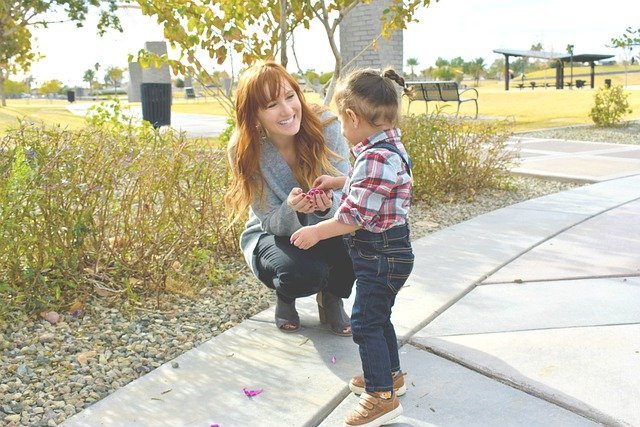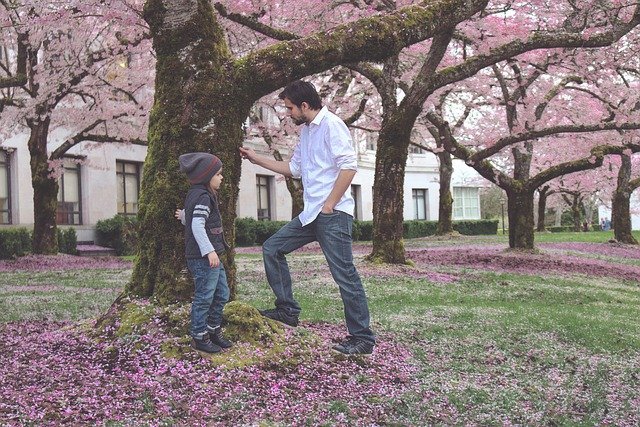"Padres y el reto de enseñar a los hijos a decir la verdad " [Es-En]
Saludos y buenos deseos para todos en la comunidad de Motherhood. En esta oportunidad, comparto con ustedes este tema que espero pueda serles de mucho agrado.

¿Alguna vez han escuchado a un niño decir una mentira para ganarse un dulce, obtener un juguete o quizás para librarse de una disciplina? Creo que la respuesta es tan obvia y común como la misma etapa de la infancia en la que los niños empiezan a experimentar situaciones en las que se verán ante la opción de decir la verdad o no.
La verdad no es innata en nosotros, y mientras vamos creciendo vamos entendiendo la diferencia entre un “sí” y un “no”, entre lo que es una verdad y una mentira, lo bueno y lo malo así como vamos comprendido la importancia de poder comunicarnos con nuestros padres de manera clara y sincera. Por eso, es muy esencial que los padres vayan cultivando esto en sus hijos lo más pronto posible a fin de que ellos puedan entender que dicha enseñanza es para su bienestar y crecimiento personal.
Normalmente los niños no mienten con mala intención o con el fin de dañar a alguien, más bien llegan a hacerlo cuando ven que no se les comparte o complace con algo que desean en el momento, así que pienso que una de las claves es, no tildar al niño de mentiroso de una sola vez, sino tratar de entender porque lo está haciendo. De esta forma, se puede atender la situación de raíz y así encontrar la ayuda fundamental para el niño.
Para esto, es muy importante ser pacientes y comprensivos. ¿Por qué? En una ocasión, recuerdo que en quinto grado hubo una clase que nunca entendí la cual se basaba en el árbol genealógico. En el examen final de lapso, salí reprobado en dicha materia pues básicamente se trataba de ese tema y aunque mi primero intención era botar el examen o inventar algo, no pude hacerlo porque el examen debía ser firmado por mi representante. Al mostrárselo a mi mamá, me sorprendió su reacción pues en vez de enfadarse, ella me dijo que sabía que esa clase se me dificultaba mucho, y que aún debía esforzarme más en mi estudio.
Con esto, me sentí comprendido y a la vez entendí que lo mejor siempre es decir la verdad, aunque no fue lo que pensé en primera opción. Con esto no quiero decir que desde allí fui un niño que no dijo más mentiras, pero lo cierto es que entendí la importancia de no ocultar la verdad.

Otra de las cosas que me ayudó a ver el valor de decir la verdad fue el ejemplo de mi mamá y los adultos que estaban a mi alrededor. Mientras yo escuchaba a otros decir “Yo digo esto porque soy grande” o “es solo una mentira blanca”, quienes me cuidaban me dieron un buen ejemplo con hechos y palabras.
En una ocasión una de mis tías derramó una taza grande de café sobre el mesón de la cocina, y aunque nadie estaba cerca de ella yo logré verla desde lejos. Cuando me le acerqué, le dije: “¿Qué pasó aquí?” pero era una pregunta para saber qué diría ella pues yo ya había visto todo. Me sorprendió mucho cuando ella reconoció que había sido su culpa y enmendó todo preparando más café.
Y es que como niños somos muy observadores y no olvidamos nada. Si un niño escucha a sus padres o a otro adulto decir mentira, el asumirá la misma libertad para hacerlo, y cuando se le quiera corregir, puede salir con esas expresiones tan fuertes y espontáneas cómo: “Ah, pero usted también dice mentiras”.
“La enseñanza es más saludable que la amenaza” Y esto lo cito recordando en una ocasión cuando me dijeron que, si decía una mentira me moverían la cama en la noche, así que fueron varias en las que no pude dormir. Luego me dijeron que eso era mentira, y que era para que evitara mentir, pero pienso que el método no era el más adecuado. Más bien, hablar y explicar lo bueno de siempre ser veraces en lo que decimos es algo que con prudencia y paciencia puede llegar con un efecto mayor. Y creo que de aquí nace una idea de “nunca tratar de incentivar a decir la verdad en base a una mentira”.
Son muchos los beneficios personales y sociales que podemos alcanzar si cultivamos en los niños la importancia de decir la verdad en todo momento. Incluso esto será una protección para ellos a medida que vayan creciendo, y estrechará aún más la confianza que siempre debe brillar y mantenerse entre padres e hijos, uniendo a la familia y forjando un vínculo de amor y compresión duradero.

Gracias por darle valor a esta publicación con tu tiempo y atención.
Hasta pronto.
Greetings and good wishes to everyone in the Motherhood community. In this opportunity, I share with you this topic that I hope you will enjoy.

Have you ever heard a child tell a lie to earn a piece of candy, get a toy or perhaps to get out of a discipline? I think the answer is as obvious and common as the very stage of childhood in which children begin to experience situations in which they will be faced with the choice of telling the truth or not.
The truth is not innate in us, and as we grow up we understand the difference between a "yes" and a "no", between what is a truth and a lie, what is good and what is bad, and we understand the importance of being able to communicate with our parents in a clear and sincere way. Therefore, it is very essential that parents cultivate this in their children as soon as possible so that they can understand that this teaching is for their well-being and personal growth.
Normally children do not lie with bad intentions or in order to harm someone, but rather they do it when they see that they are not shared or pleased with something they want at the moment, so I think one of the keys is not to label the child as a liar all at once, but to try to understand why they are doing it. In this way, you can address the root of the situation and find the fundamental help for the child.
For this, it is very important to be patient and understanding. Why? On one occasion, I remember in fifth grade there was a class I never understood that was based on the family tree. In the final exam, I flunked that subject because it was basically about that topic and although my first intention was to throw the exam away or make something up, I could not do it because the exam had to be signed by my representative. When I showed it to my mother, I was surprised by her reaction because instead of getting angry, she told me that she knew that I was having a hard time with that class, and that I still had to make more effort in my study.
With this, I felt understood and at the same time I understood that the best thing is always to tell the truth, although it was not what I thought in first option. With this I do not mean that from then on I was a child who did not tell any more lies, but what is certain is that I understood the importance of not hiding the truth.

Another thing that helped me see the value of telling the truth was the example of my mom and the adults around me. While I would hear others say "I say this because I'm big" or "it's just a white lie," those who cared for me set a good example for me with deeds and words.
On one occasion one of my aunts spilled a large cup of coffee on the kitchen counter, and although no one was near her I managed to see it from a distance. When I approached her, I said, "What happened here?" but it was a question to find out what she would say since I had already seen everything. I was very surprised when she acknowledged that it had been her fault and made amends by making more coffee.
And the thing is that as children we are very observant and we don't forget anything. If a child hears his parents or another adult tell a lie, he will assume the same freedom to do so, and when you want to correct him, he may come out with such strong and spontaneous expressions as: "Ah, but you also tell lies".
"Teaching is healthier than threatening" And I quote this remembering an occasion when I was told that if I told a lie they would move my bed at night, so there were several times when I could not sleep. Later I was told that this was a lie, and that it was so that I would avoid lying, but I think that the method was not the most appropriate. Rather, talking and explaining the good of always being truthful in what we say is something that with prudence and patience can come with a greater effect. And I believe that from here comes an idea of "never try to encourage telling the truth based on a lie".
There are many personal and social benefits that we can achieve if we cultivate in children the importance of telling the truth at all times. This will even be a protection for them as they grow up, and will further strengthen the trust that should always shine and be maintained between parents and children, uniting the family and forging a lasting bond of love and understanding.

Thank you for adding value to this publication with your time and attention.
See you soon.
Hola @cajiro. Lo mejor es enseñar con ejemplo así como lo hicieron contigo. Los niños mienten cuando aprenden a identificar mecanismos de defensa. Es decir, si mentir los saca de algún problema entonces lo siguen haciendo. No es malo pero, si lo hacen costumbre sí lo será. El deber como padres es estar atentos, hablar más, reprender menos.
Saludos cordiales para ti!
Y si la atención y el ejemplo van de la mano pues será más fácil hacerles ver el gran valorar de siempre decir la verdad 🙂
Gracias amiga @belkisa758 por compartir tus valiosas palabras a través de tu comentario
Saludos y mucho éxito para ti 🙂👋👋👋
https://twitter.com/Cajiro57/status/1575247306743599105
The rewards earned on this comment will go directly to the people( @cajiro ) sharing the post on Twitter as long as they are registered with @poshtoken. Sign up at https://hiveposh.com.
Yo pienso que siempre va a depender del ejemplo que los adultos le demos en casa como tú lo mencionaste, claro eso no quiere decir que en algún momento va hacerlo, otra cosa importante que mencionaste es el hecho de como reaccionamos los adultos ante algo que ellos hagan, como por ejemplo tu examen, a veces tomarnos actitudes muy severas que ellos pueden verse en la necesidad de mentir para no tener que lidiar con las represalias que toman algunos padres.
Si amiga @mirel0510 y aunado a eso, si la disciplina no es con equilibrio también la opción a ocultar la verdad se ve más grande
Gracias por aportar este comentario al tema de esta publicación 🙂 muy valioso, práctico para destacar algo tan importante como lo es la actitud 😊😊
El mayor de los éxitos para ti @mirel0510 😊😊 Cuidate 👋👋
Me encantó tu post amigo @cajiro, eso siempre se lo he dicho a mis hijos, siempre hay que decir la verdad porque luego si mientes, nadie te creerá cuando vayan a decir una verdad. En pocas palabras ni hay necesidad de mentir si sientes q hiciste algo que no debes es mejor confiar y hablar con tus padres para que sean ellos quiénes te puedan ayudar. Vivo constantemente diciéndoles la verdad por delante. Gracias por tu post, saludos y Bendiciones
Me alegra mucho saber que eres esa madre ejemplar que inculca esta clase de valores a sus hijos 👍 👏👏
Gracias por compartir tu excelente comentario amiga @floreudys79 Saludos y éxitos 😊😊